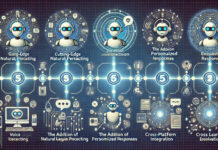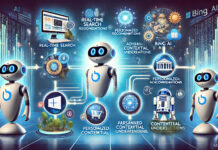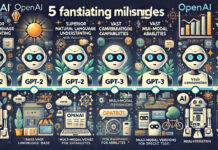Table of Contents
Artificial Intelligence (AI) is profoundly changing the software development lifecycle (SDLC), from planning and coding to testing and deployment. These changes bring more efficiency, accuracy, and innovation. In this article, we explore how AI enhances every stage of the SDLC, offering developers tools to create better software faster and with fewer errors.
1. Understanding AI-Driven Software Development
AI-driven software development leverages AI to enhance and automate various aspects of the software lifecycle. From code generation to automated testing, AI streamlines processes, increases efficiency, and reduces human error.
AI in Code Generation
AI significantly impacts code generation. Tools like OpenAI’s Codex convert natural language instructions into code, allowing developers to quickly generate functional code snippets. This speeds up development and lets developers focus on complex and creative software design aspects.
Automated Debugging and Error Detection
Debugging is critical in software development and often requires much time. AI-driven tools automatically detect and fix bugs, significantly reducing debugging time. These tools analyze code, identify potential issues, and suggest or implement fixes, ensuring robust and reliable software.
Enhanced Testing and Quality Assurance
AI revolutionizes the testing phase by automating test case generation, execution, and result analysis. Automated testing tools simulate various user interactions, detect anomalies, and ensure the software performs as expected. This leads to higher software quality and faster release cycles.
2. Benefits of AI in Software Development
Integrating AI into software development offers numerous benefits, enhancing productivity, accuracy, and innovation.
Increased Efficiency
AI automates repetitive tasks, freeing developers to focus on more strategic and innovative work. This increased efficiency leads to faster development cycles and quicker time-to-market for new software products.
Improved Accuracy
AI-driven tools minimize human errors by providing precise code generation, debugging, and testing capabilities. This precision enhances the overall quality of software, reducing the number of bugs and vulnerabilities.
Cost Savings
By automating tasks, AI reduces the need for extensive human resources, resulting in significant cost savings, especially in large-scale projects. This makes software development more cost-effective and accessible.
Enhanced Innovation
AI enables developers to experiment with new ideas by handling routine tasks. This fosters a culture of innovation, allowing teams to explore cutting-edge technologies and methodologies.
3. Challenges of AI-Driven Software Development
Despite its numerous benefits, AI-driven software development presents several challenges that must be addressed.
Data Privacy and Security
AI systems rely on vast amounts of data to function effectively. Ensuring data privacy and security is crucial. Developers must implement robust security measures to protect sensitive information and comply with data protection regulations.
Algorithmic Bias
AI algorithms can exhibit bias if trained on biased data. This can lead to unfair or inaccurate outcomes in software applications. Ensuring AI systems are trained on diverse and representative datasets is crucial to minimize bias and promote fairness.
Skill Gaps
Integrating AI in software development requires new skills and knowledge. Developers must be trained in AI technologies, algorithms, and data science to leverage AI effectively. Bridging this skill gap is essential for successful AI-driven development.
Ethical Considerations
AI-driven software development raises ethical questions about job displacement, decision-making, and accountability. Addressing these ethical considerations is crucial to ensure AI is used responsibly and benefits society.
4. The Future of AI-Driven Software Development
The future of software development will likely see greater AI integration. As AI evolves, its capabilities will expand, leading to more sophisticated and intelligent development tools.
AI-Augmented Development Environments
Future development environments will likely feature AI-augmented capabilities that assist developers in real-time. These environments will offer intelligent code suggestions, automated error detection, and personalized learning resources, enhancing the overall development experience.
Collaborative AI and Human Development
The future will see a more collaborative approach, where AI and human developers work together seamlessly. AI will handle routine tasks, while human developers focus on creativity, problem-solving, and strategic decision-making.
Continuous Learning and Adaptation
AI systems will continuously learn and adapt to new data and changing requirements. This will enable them to provide increasingly accurate and relevant insights, improving the quality and efficiency of software development.
Conclusion
AI is transforming the software development landscape, offering unprecedented opportunities for efficiency, accuracy, and innovation. While challenges exist, the benefits of AI-driven development far outweigh the drawbacks. By embracing AI technologies and addressing the associated challenges, developers and organizations can navigate the AI-driven software development landscape successfully, paving the way for a future of intelligent and innovative software solutions.
For further insights into AI and its impact on various industries, continue exploring our series on AI technologies, Opinions, and Analyses.
FAQ
1. What is AI-driven software development? AI-driven software development uses artificial intelligence to enhance and automate various stages of the software development lifecycle, including code generation, debugging, testing, and deployment.
2. How does AI improve code generation? AI tools like OpenAI’s Codex can convert natural language instructions into code, allowing developers to quickly generate functional code snippets, speeding up development and reducing human error.
3. What are the benefits of AI in software testing? AI automates test case generation, execution, and result analysis, leading to higher software quality and faster release cycles by simulating various user interactions and detecting anomalies.
4. What challenges does AI-driven software development face? Challenges include data privacy and security, algorithmic bias, skill gaps, and ethical considerations regarding job displacement and decision-making accountability.
5. How will AI shape the future of software development? AI will continue to evolve, offering more sophisticated development tools, AI-augmented environments, and collaborative AI-human development processes, enhancing the efficiency and innovation in software development.



